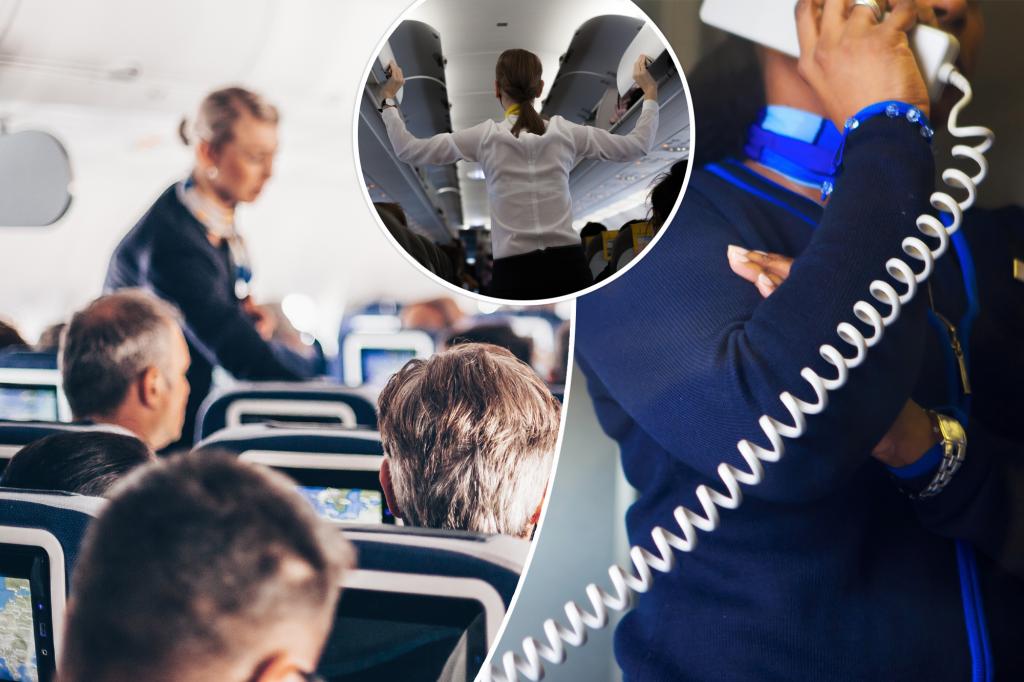Have a nice fright.
While air travel is stressful enough on its own, certain in-flight situations can make it a real nightmare in the sky.
That’s why flight attendants have devised specific words and phrases to indicate emergencies — ranging from hijackings to missing children — sans frightening passengers.
This “secret language” allows flight attendants to “discreetly communicate situations” often “without passengers ever noticing,” travel experts at Wander told the HuffPost.
As a service to flyers, Wander travel experts have decoded seven common crewmember code words that indicate that things have gone haywire
Code 300 and Angel
The somewhat innocuous-sounding “Code 300” and “Angel” indicate that someone has died on board.
In the event of an in-flight death, crewmembers are supposed to transfer the deceased to a seat, ideally one without a lot of passengers nearby.
Unfortunately, that doesn’t always happen, as was the case with a couple who were forced to sit next to a woman’s body for several hours after she dropped dead on a 15-hour flight from Australia to Qatar.
In general, the crew is expected to “take extra care when moving the person and be aware of the difficulty of the situation for companions and onlookers,” according to protocol outlined by the International Air Travel Association (IATA).
They also must alert the destination airport ASAP so emergency crewmembers can mobilize in time for their arrival, the HuffPost reported.
Interestingly, “when the aircraft does land, it is considered a crime scene,” flight attendant Brieana Young said in a 2021 interview. “So the police come on and assess the whole aircraft and the passengers. So if that [death on board] ever happens on your flight, expect to be there for a little while after you land.”
Code Yellow
“Code Yellow” is reserved for more minor medical situations such as a passenger feeling nauseous or faint, the Daily Mail reported.
While not as dire as a “Code 300,” the secret phrase allows crew members keep tabs on the situations and prepare to act should said person’s condition deteriorate.
Pan-Pan
By a similar token, “Pan-Pan” is reserved for situations that are “serious but non-life-threatening” such as mechanical issues or medical emergencies, according to Simple Flying.
The signal could be used to indicate “loss of an aircraft system that does not immediately impact the flight but might require rerouting or landing at a nearby airport,” the site writes.
It’s a step down from “May-Day,” which indicates that a flight is in immediate danger.
Squawk 700 or Hotel
On a far more serious note, hearing “Squawk 700” or “Hotel” from air traffic control signifies that a hijacking is in progress.
“If you ever hear this code mentioned by the flight crew or air traffic control, it signals a potential security threat on the flight,” the experts caution, per the Daily Mail. “The aircraft’s transponder will send a signal with this code to alert authorities that the plane is in danger.”
Mermaid
A far cry from its “regal” characterization in mythology, “mermaid” in crewmember code signifies a passenger who sprawls across several seats, often with the goal of preventing other passengers from sitting down.
This behavior is common on flights with vacant seats with mile-high “mermaids” spreading out their belongings and bodies, and generally treating the space like an apartment with wings.
Code Adam
This chilling phrase is employed in the rare event that a child goes missing on the plane. Upon hearing it, airport employees will search the aircraft for the child and block off exits to stop any kidnapping attempts, the DM reported.
It was named after the Adam Walsh Child Safety Act, which was enacted in 2006 to help prevent child abductions.
VIP
While more commonly used to refer to a “very important person,” in crew member lexicon “VIP” can signify a “Very Irritating Passenger” as well.
This can get confusing in the aviation industry where both terms appear to apply in abundance.
The term VIP is specifically reserved for entitled passengers who make excessive demands and are generally difficult to manage, but don’t actually break any rules.
One can think of them as the airborne version of a “Karen,” a disparaging term used for women who are perceived as entitled or demanding.
A subgenus of the “VIP” is the “Philip,” defined as a passenger who rings the call button incessantly and demands flight attendants’ immediate attention for minor requests such as drinks.
“That name originated from the term PILP — Passenger I’d Like to Punch — but has changed over time to become slightly more subtle,” explained one crewmember, who chose to go anonymous.
“If you’re labeled a Philip, then you’ve done something wrong and should probably expect to get bad service for the rest of the flight.”
Read the full article here

